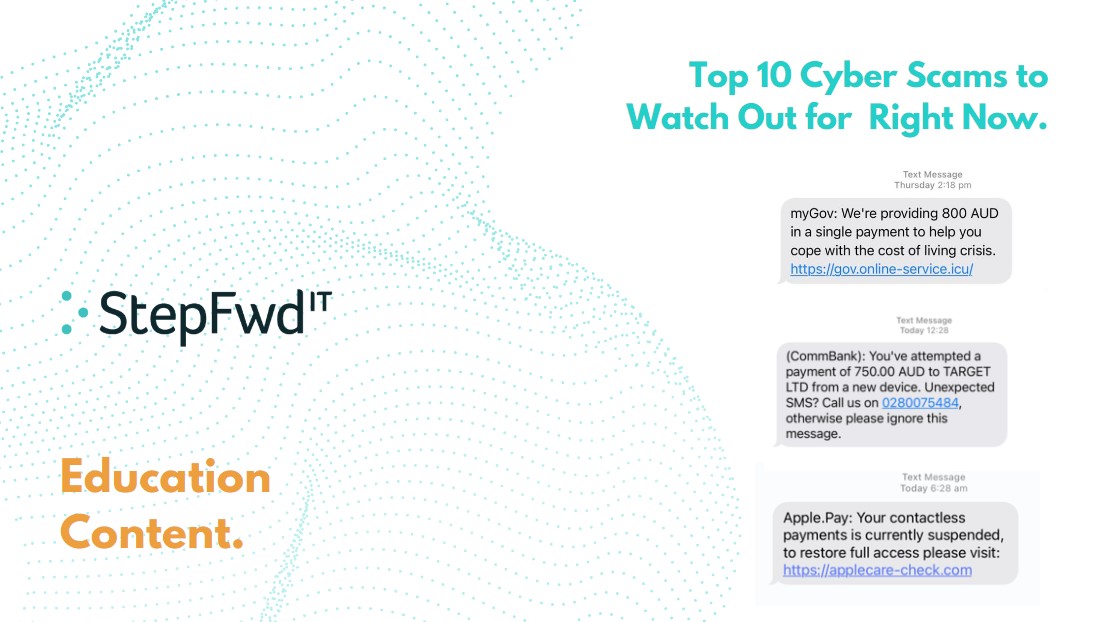
Top 10 Cyber Scams to Watch Out for Right Now
There are numerous fraudulent activities taking place in the digital realm today, and keeping track of them all can be quite challenging.
As a leading IT Partner committed to providing thought leadership, we have compiled a list of ten of the most prevalent online scams that are currently circulating. Here’s the list of 10 as of right now:
1. MyGov Text Message Scam
An illegitimate text message claims to originate from MyGov and promises an $800 payout to help cover living expenses. The message includes a hyperlink that directs recipients to a counterfeit website where they are asked to share their banking information and personal details, such as their Customer Reference Number (CRN) or Tax File Number (TFN).
MyGov has stated that it will not request such information via email, SMS, direct message, or private chat.
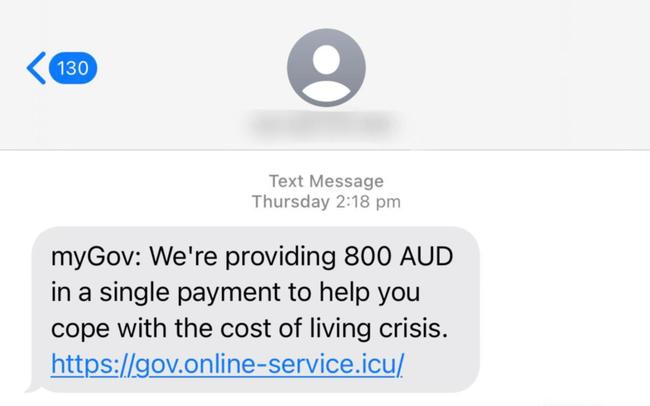
2. AusPost Email Scam
Instances of deceptive emails masquerading as the customer service team of Australia Post are indicating that parcels are “on hold” have been identified recently.
MailGuard, a global leader in the email security sector, advises all recipients of this email to delete it immediately and to do so without clicking on any links.
3. CommBank Text Message Scam
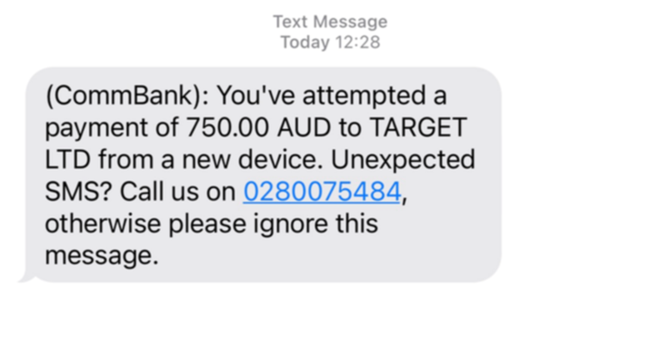
Hackers pretending to be representatives of Commonwealth Bank are falsely claiming that customers have incomplete transactions and requesting them to disclose personal information. CommBank has released an official cautionary statement, advising clients to disregard any such messages and refrain from contacting or responding to the sender.
4. Linkt & Eastlink Text Message Scam
An illicit scheme has been discovered where fraudulent toll messages are being sent to toll-using motorists, resulting in a loss of more than $660,000 to consumers in 2022. The scam entails the transmission of fake messages to drivers, falsely alleging that they have outstanding toll payments or that their Linkt toll account has been suspended.
Having been heavily compromised by this scheme, Linkt has officially stated that they would never send such warning via text message.
There is a new fraudulent email going around, pretending to be a genuine message from DHL. Its primary targets are people who are expecting a delivery. According to the email, the package could not be delivered, and the recipient is encouraged to click on a hyperlink. Security professionals strongly advise against clicking on any of the links in the email and suggest deleting it right away.
5. NAB PayID Scam
NAB has observed a rise in PayID-related scams, with scammers attempting to buy goods from victims using PayID and then demanding payment through a fake business account. Victims are pressured into reimbursing the scammer after receiving a fake email as evidence.
According to Scam Watch, Australians lost $260,000 to PayID-specific impersonation scams last in 2022, while total scam reports relating to NAB increased by 38% across the previous twelve month period.
6. Apple Pay Text Message Scam
Cyber criminals are impersonating Apple Pay service in a phishing scam, where users are receiving text messages from unknown numbers containing a message similar to “Apple Pay: Your contactless payment is currently suspended. To restore full access, please visit applecare-check.com.” Clicking on the link provided takes users to a fake website that resembles Apple’s homepage and asks them to “re-activate your Apple Pay.”
Users are then taken to another page where they are prompted to enter their information, which the scammers can use to gain access to their account.
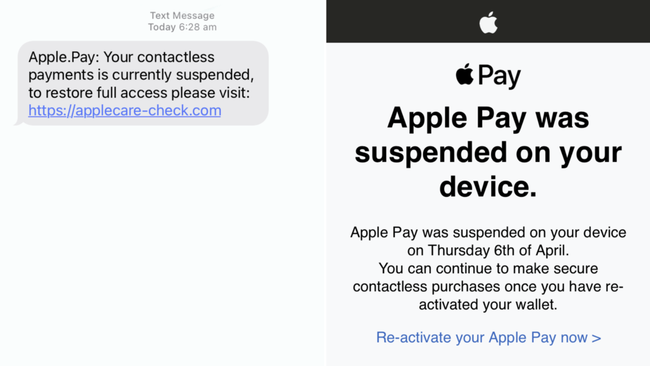
7. DHL Email Scam
There is a recent emergence of a fraudulent email scam that pretends to be a legitimate message from DHL. This particular scheme targets people who are waiting for a package to be delivered, claiming that the package delivery was unsuccessful and prompts the receiver to click on a hyperlink.
Experts in the field of cybersecurity advise individuals not to click on any links provided in the email and to delete it promptly.
8. Google Email Scam
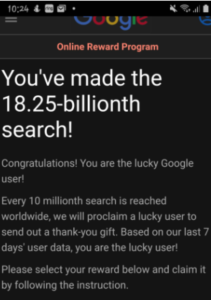
It is recommended that individuals who receive an email that seems to be from Google offering a reward for aiding the company in achieving a search milestone should promptly erase and report it.
Google has warned any emails or advertisements offering prizes are fraudulent and suggests reporting any emails that suggest otherwise as spam.
A particular variation of the email, which can be found on the internet, commends the recipient for completing the “18.25 billionth search.” It is crucial to keep in mind that no representative from Google will ever demand immediate payment or solicitation of personal data.
9. Instagram / Shein Subscription Scam
Avast, a digital security company, has issued a warning to Australian shoppers about a fraudulent online gift card scheme that can result in a loss of $69 per fortnight for victims.
The scam targets Instagram users in Australia, offering a $500 gift card from Shein, a global fast-fashion retailer. To redeem the gift card, the user is directed to a third-party website where they are required to provide personal information and pay a $2 fee. However, there is no actual gift card, and victims are unknowingly signing up for a subscription that deducts $69 from their card every two weeks without any corresponding benefits.
10. Airport Charging Ports
This is very much a different form of scam than all the others listed, but is almost certainly one worth considering. Charging stations that are free of charge in airports can create cybersecurity vulnerabilities. These stations have the potential to install malware through corrupted USB ports, which can result in the device being locked or personal data and passwords being exported to the attacker. Therefore, for security reasons, it is advised that travelers refrain from using these stations.
Call Us!
We’d love for you to give us a call – whether you just want to have a chat or book a consultation we’re always here to help.
Book a Consultation in our Calendar!
There are a multitude of ways we can arrange a consultation, including Video Meetings and On-site Appointments.
Send us an Email!
Whether it relates to Cyber Security or any of your other IT needs, if you need a hand our email inbox will be open.